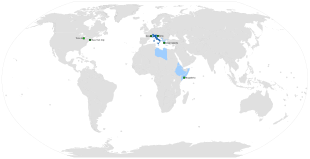Italian leid
| Italian | |
|---|---|
| Italiano, Lingua italiana | |
| Pronunciation | [itaˈljaːno] |
| Native tae | Italy, Swisserland, San Marino, Vatican Ceety, Istrie Coonty (Croatie) an Slovene Istrie (Slovenie) |
| Region | Italy, Ticino an soothren Graubünden, Slovene Littoral an wastren Istrie |
Native speakers | 69 million native speakers in the EU[1] (c.2012)[2] 90 million total speakers L2 speakers: 24 million |
| Laitin (Italian alphabet) Italian Braille | |
| Italiano segnato "(Signed Italian)"[3] italiano segnato esatto "(Signed Exact Italian)"[4] | |
| Offeecial status | |
Offeecial leid in |
|
Recognised minority leid in | |
| Regulatit bi | Accademia della Crusca (de facto) |
| Leid codes | |
| ISO 639-1 | it |
| ISO 639-2 | ita |
| ISO 639-3 | ita |
| Glottolog | ital1282[10] |
| Linguasphere | 51-AAA-q |
 Main leid
Used offeecially in the Italian colonial period; nou seicontary
Lairge Italian-speakin commonties | |

Italian is a leid spoken bi aboot 70 million fowk, maistly fowk frae Italy, frae whaur it gets its name. It is an ofeecial leid in Italy, San Marino, Vatican Ceety, Swisserland an in some ceeties o Slovenie an Croatie. It is uised in some pairts o Monaco, Maltae, Albanie, Dodecaneso (Greece), Eritrea, Libie, Ethiopie, Somalie, Tunisie, Slovenie, Croatie an some ither places an aw.
It is maistly derived frae Laitin, wi some wirds frae Greek, Etruscan an ithergates. It is cried an inflectit leid - that means that the meanin o wirds can be chynged bi chyngin their endins. Italian noons is aither masculine or feminine (thir's grammatical terms, for ordinar anerly indirect adae dae wi gender).
Maist singular masculine noons ends in -o, an maist plural masculine noons ends in -i.
Maist singular feminine noons ends in -a, an maist plural feminine noons ends in -e.
Sae - gatto = male cat, gatta = female cat, gatti = male cats, gatte = female cats
The endin o verbs is awfu complicate, acause they lippen on the tense o the verb (past, praisent, futur an sae on) an on the person o the verb (A, ye , thay etc).[11]
Frae that - parlo = A speak, parliamo = we speak, parlava = he wis speakin, parlarono = thay spak, parlerò = A will speak, parliamo = lat's speak!
There's gey mony o thir endins tae learn - it is a difficult pairt o Italian. But soondin is semple - there's anerly a puckle rules tae learn, an haurdly ony difficult soonds.
Mony Italian wirds haes entered the Scots leid. Pizza, spaghetti an ravioli is juist some o the fuid wirds that we uise. Mony technical wirds in muisic is Italian, sic as forte an allegro. Mony muisical instruments' names air Italian an aw, sic as cello an tuba. Frae the daurker side o Italian life we get Mafia an vendetta.
Notes[eedit | eedit soorce]
- ↑ "Eurobarometer – Europeans and their languages" (PDF). (485 KB), February 2006
- ↑ Italian at Ethnologue (18th ed., 2015)
- ↑ "Centro documentazione per l'integrazione". Cdila.it. Retrieved 22 October 2015.
- ↑ "Centro documentazione per l'integrazione". Cdila.it. Retrieved 22 October 2015.
- ↑ Aprovado projeto que declara o Talian como patrimônio do RS Archived 27 Januar 2012 at the Wayback Machine, accessed oan 21 August 2011
- ↑ Lewis, Simons & Fennig 2014.
- ↑ "Australian Bureau of Statistics, 2005, "Language other than English" (spreadsheet of figures from 2001 Census)". Archived frae the original on 20 Julie 2008. Retrieved 14 Mey 2018.
- ↑ http://ec.europa.eu/public_opinion/archives/ebs/ebs_243_en.pdf
- ↑ Bernasconi, Giulia (2012). "L'ITALIANO IN VENEZUELA". Italiano LinguaDue (in Italian). Università degli Studi di Milano (2): 20. doi:10.13130/2037-3597/1921. Archived frae the original on 2 Februar 2017. Retrieved 22 Januar 2017.
L'italiano come lingua acquisita o riacquisita è largamente diffuso in Venezuela: recenti studi stimano circa 200.000 studenti di italiano nel Paese
- ↑ Nordhoff, Sebastian; Hammarström, Harald; Forkel, Robert; Haspelmath, Martin, eds. (2013). "Italian". Glottolog. Leipzig: Max Planck Institute for Evolutionary Anthropology.
- ↑ Berloco 2018
References[eedit | eedit soorce]
- Berloco, Fabrizio (2018). The Big Book of Italian Verbs: 900 Fully Conjugated Verbs in All Tenses. With IPA Transcription, 2nd Edition. Lengu. ISBN 9788894034813.
- Palermo, Massimo (2015). Linguistica italiana. Il Mulino. ISBN 9788815258847.
- Simone, Raffaele (2010). Enciclopedia dell'italiano. Treccani.
Ither wabsites[eedit | eedit soorce]
- Italian grammar and interactive course (in Inglis)
- Italian proverbs(in Inglis)
- Italian Learning Tips Archived 2021-01-26 at the Wayback Machine(in Inglis)
- Italian Grammar Primer(in Inglis)
- Italian Online Dictionaries and Glossaries Archived 2007-12-26 at the Wayback Machine(in Inglis)
See Forby[eedit | eedit soorce]
| Wikimedia Commons haes media relatit tae Italian language. |
